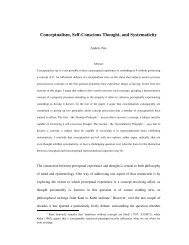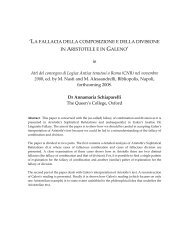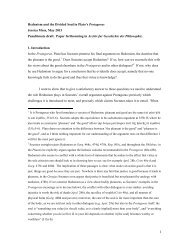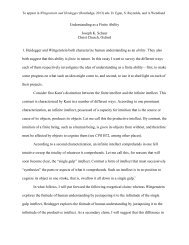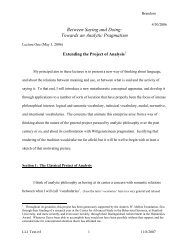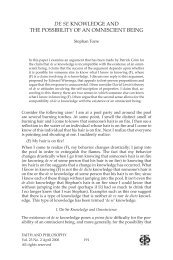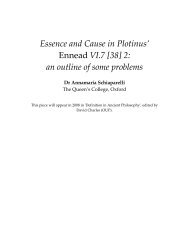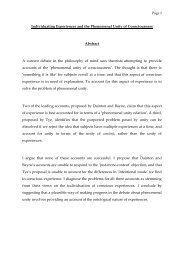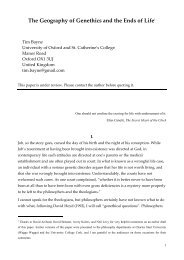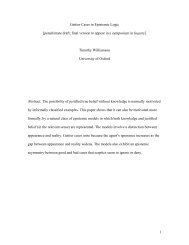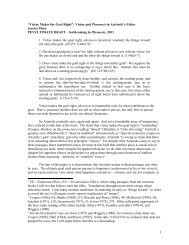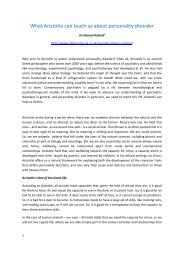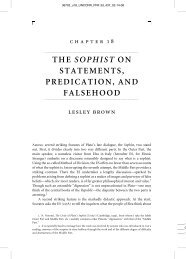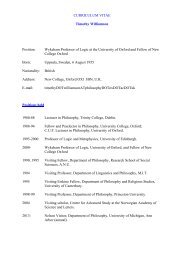Say who everyone is as you go along - Faculty of Philosophy ...
Say who everyone is as you go along - Faculty of Philosophy ...
Say who everyone is as you go along - Faculty of Philosophy ...
Create successful ePaper yourself
Turn your PDF publications into a flip-book with our unique Google optimized e-Paper software.
36<br />
'Whatever standpoint <strong>of</strong> philosophy we may adopt today: from every point <strong>of</strong> view<br />
the erroneousness <strong>of</strong> the world in which we believe we live <strong>is</strong> the surest and firmest<br />
thing we can get our eyes on' (BGE para 34 p. 64) (cf also 48 ff.)<br />
What does th<strong>is</strong> mean? The p<strong>as</strong>sage bears several mutually cons<strong>is</strong>tent interpretations,<br />
but one <strong>of</strong> them concerns Chr<strong>is</strong>tianity and another philosophical ideal<strong>is</strong>m.<br />
Nietzsche's athe<strong>is</strong>tic perspectiv<strong>is</strong>m <strong>is</strong> partly a sustained philosophical and<br />
h<strong>is</strong>torical critique <strong>of</strong> Chr<strong>is</strong>tianity. Nietzsche maintains that although the metaphysical<br />
and ethical outlook <strong>of</strong> the West <strong>is</strong> essentially Chr<strong>is</strong>tian, by the mid-nineteenth<br />
century th<strong>is</strong> outlook <strong>is</strong> in pr<strong>of</strong>ound cr<strong>is</strong><strong>is</strong>. H<strong>is</strong> claim that God <strong>is</strong> dead <strong>is</strong> that fewer and<br />
fewer people believe in God. In so far <strong>as</strong> Chr<strong>is</strong>tian faith <strong>is</strong> fundamentally shaken, all<br />
moral values that rely on Chr<strong>is</strong>tian theological prem<strong>is</strong>es are undermined. They lack<br />
justification. It <strong>is</strong> not so much h<strong>is</strong> own philosophical project to establ<strong>is</strong>h a new set <strong>of</strong><br />
non-Chr<strong>is</strong>tian values <strong>as</strong> to predict and urge the emergence <strong>of</strong> a new kind <strong>of</strong> human<br />
being <strong>who</strong> will freely create non-Chr<strong>is</strong>tian values <strong>of</strong> h<strong>is</strong> own: the Übermensch. The<br />
Übermensch will be beyond <strong>go</strong>od and evil: beyond conventional, western, Chr<strong>is</strong>tian,<br />
<strong>go</strong>od and evil.<br />
Read th<strong>is</strong> way, the world in which we think we live <strong>is</strong> the Chr<strong>is</strong>tian world, a world<br />
not only <strong>of</strong> other people and physical objects but also the ex<strong>is</strong>tence <strong>of</strong> God, the<br />
divinity <strong>of</strong> Chr<strong>is</strong>t, the truth <strong>of</strong> the resurrection, the fall, purgatory, hell and heaven,<br />
the possibility <strong>of</strong> eternal salvation or eternal damnation. Nietzsche <strong>is</strong> saying that on<br />
any kind <strong>of</strong> philosophy contemporary with h<strong>is</strong> own, athe<strong>is</strong>m <strong>is</strong> true, or, to put it<br />
another way, th<strong>is</strong> entire the<strong>is</strong>tic world picture <strong>is</strong> false.<br />
It <strong>is</strong> indeed possible to view nineteenth century European philosophy <strong>as</strong><br />
incre<strong>as</strong>ingly athe<strong>is</strong>tic. Although the Dan<strong>is</strong>h Lutheran philosophical theologian Søren<br />
Kierkegaard <strong>is</strong> a strongly committed the<strong>is</strong>t, h<strong>is</strong> bleak and pessim<strong>is</strong>tic ex<strong>is</strong>tential<strong>is</strong>m<br />
leaves logical and emotional room for doubting the ex<strong>is</strong>tence <strong>of</strong> God. If the leap <strong>of</strong><br />
faith can be taken it can be not taken. Although there can be no genuine Chr<strong>is</strong>tian<br />
faith without the logical possibility <strong>of</strong> doubt, and if God's ex<strong>is</strong>tence could be proven<br />
using logic there would be no need for faith, Kierkegaard's the<strong>is</strong>m contr<strong>as</strong>ts with that<br />
<strong>of</strong> h<strong>is</strong> the<strong>is</strong>tic predecessors. Not only the medieval schol<strong>as</strong>tics, Anselm, Aquin<strong>as</strong> and<br />
Scotus but also the continental 'rational<strong>is</strong>ts' Descartes, Leibniz and, in a way,<br />
Spinoza, thought the ex<strong>is</strong>tence <strong>of</strong> God could be proven. They made strenuous efforts<br />
to prove the ex<strong>is</strong>tence <strong>of</strong> God by philosophical argument. The arguments against<br />
arguments deployed by Hume in The Treat<strong>is</strong>e <strong>of</strong> Human Nature and by Kant in The<br />
Critique <strong>of</strong> Pure Re<strong>as</strong>on seemed to c<strong>as</strong>t doubt on the possibility <strong>of</strong> proving the<br />
ex<strong>is</strong>tence <strong>of</strong> God, and thereby contributed to the nineteenth century athe<strong>is</strong>m<br />
Nietzsche draws our attention to. Nevertheless Kant attempted an 'ethical' pro<strong>of</strong> <strong>of</strong><br />
God's ex<strong>is</strong>tence in h<strong>is</strong> moral philosophy. Kierkegaard does not even attempt that.<br />
W<strong>as</strong> Hegel a the<strong>is</strong>t? Although in h<strong>is</strong> private life the early nineteenth century<br />
German ideal<strong>is</strong>t espoused an orthodox protestant<strong>is</strong>m, it <strong>is</strong> far from clear that th<strong>is</strong> <strong>is</strong><br />
logically cons<strong>is</strong>tent with the dialectical progress <strong>of</strong> Spirit <strong>as</strong> depicted in h<strong>is</strong> The<br />
Phenomenology <strong>of</strong> Spirit. It <strong>is</strong> h<strong>is</strong> considered philosophical view that Spirit, or Ge<strong>is</strong>t,



